Taste the fresh flavor of spring in Jeju-do and Jeolla-do!
The fresh spring flavor awakens your palate
When the spring wind tickles your nostrils, visit Jeju-do and Jeolla-do to introduce your palate to the first season of the year. These two regions are where you can first sense the arrival of spring with the delicious flavors of the new season. Jeolla-do, adjacent to beautiful Jeju-do and the sea, has earned its fame as a “town of flavors” due to its refreshing spring greens and seafood, which awaken your palate.
Jeju-do
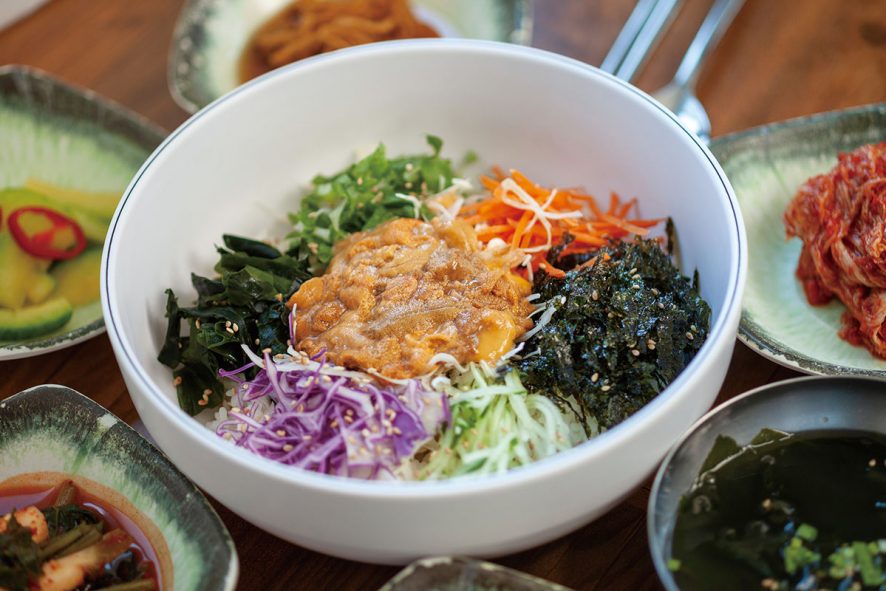
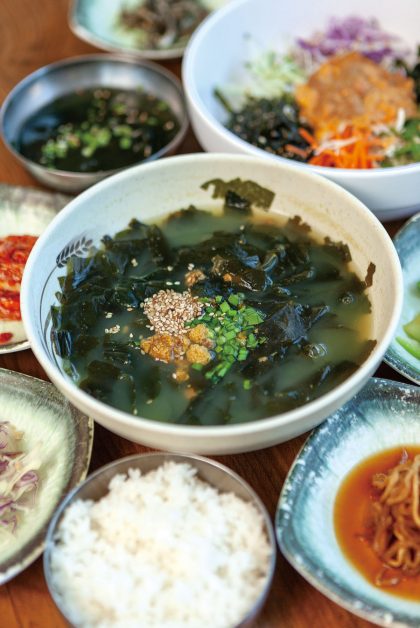
Seongge bibimbap, Seongge miyeokguk
Savory sea urchin roe brimming with the aroma of the spring sea can be enjoyed with bibambap or seaweed soup
A bowl of steamed rice is decorated with fresh lettuce, cabbage, carrots and topped with seonggeal (sea urchin roe) bringing you the fresh aroma of the spring sea. The vivid colors of the sea urchin roe bibimbap excite both your appetite and vision. Blend all the ingredients together and savor a spoonful. The rich flavor and aroma of the sea urchin delight your taste buds. The harmonious mixture of veggies, steamed rice and urchin roe take your breath away. The seaweed and urchin roe soup is another dish not to be missed in Jeju-do. Freshly cooked rice boosts the umami flavor of the urchin roe. These dishes bring you a small but definitive pleasure.
Recommended Restaurants
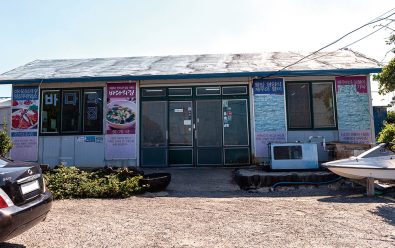
Badauijip
- Address:
- 2758 Haemajihaean-ro, Seongsan-eup, Seogwipo-si, Jeju-do
- Tel:
- 064-784-8882
- Business Hour:
- 08:00-till ingredients run out
- Open year-round

Sangchunjae
- Address:
- 26 Seonjin-gil, Jocheon-eup, Jeju-si, Jeju-do
- Tel:
- 064-725-1557
- Business Hour:
- 10:00~18:00
- Closed Mondays
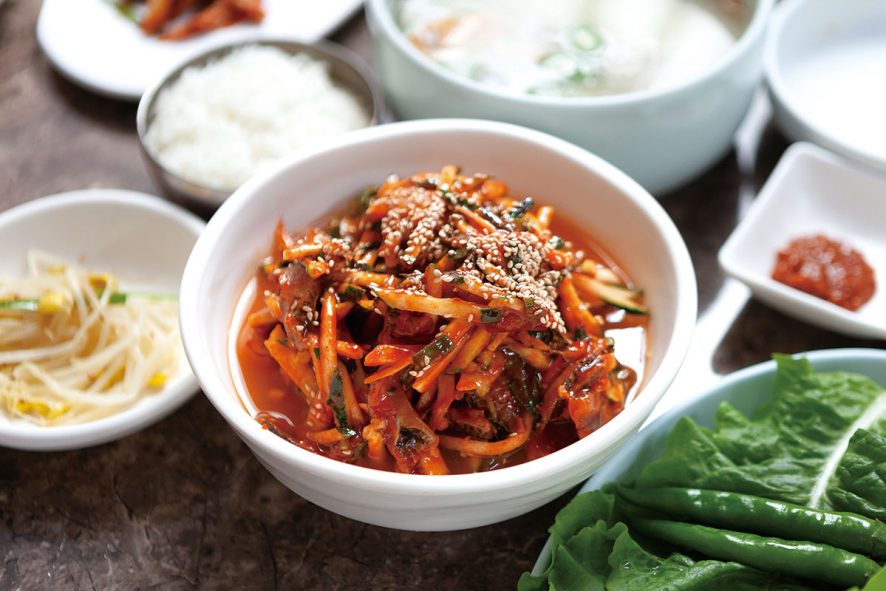
Jarimulhoe, Galchi guk
Unique ways of experiencing fresh fish in cold mulhoe (rawfish in cold broth) or warm guk (fish soup)
Jari is a fish that is the size of an adult’s palm. After it is scaled and gutted, the whole fish including the bones are eaten. Chopped vegetables, ice cubes and damselfish are poured into a soybean paste broth to make jarihoe. Be sure to include some veggies and sweet & spicy broth, when tasting the jarihoe. The mixture of the yummy fillet and the crunchy bones is heavenly. Beltfish soup is another delicacy for spring. The soft and sweet fish is mixed with winter napa cabbage, sweet pumpkin and chili pepper — all brought together to a boil presenting a savory experience.
“Galchi guk made with fresh seasonal galchi never tastes fishy. The tender galchi fillet melts in your mouth quickly like dreamy ice cream.”
Recommended Restaurants
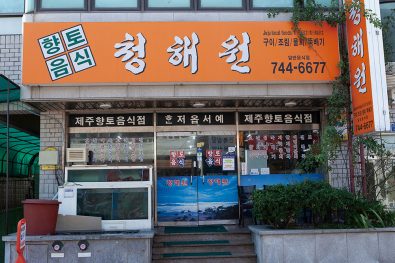
Cheonghaewon
- Address:
- 44 Wonnohyeongnam, 1-gil, Jeju-si, Jeju-do
- Tel:
- 064-744-6677
- Business Hour:
- 08:30 ~ 22:00
- Open year-round
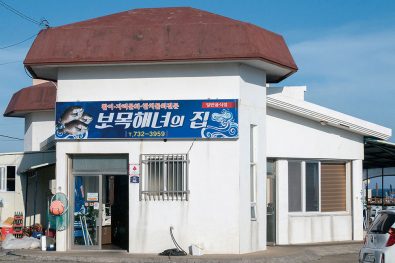
Bomok Haenyeouijip
- Address:
- 46 Bomokpo-ro, Seogwipo-si, Jeju-do
- Tel:
- 064-732-3959
- Business Hour:
- 10:00~20:00
- Open year-round
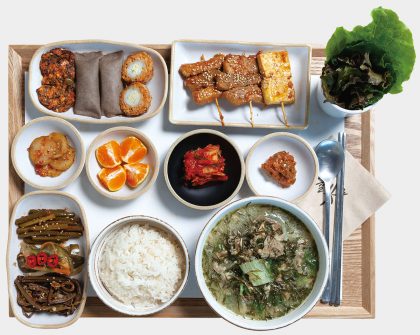
Momguk (gulfweed soup)
Pork broth mixed with gulfweed creates a full flavored soup feast
Momguk is soup made with pork bones, meat broth and gulfweed. Mojaban (gulfweed) is called mom in the Jeju dialect, hence the name momguk. The broth has a rich flavor, whereas the seaweed adds the fresh aroma of the sea. The gulfweed offsets the fatty pork to create a balanced dish and adds a unique chewy texture. Buckwheat flour or sujebi (hand-pulled pasta dough) are often added to create a thicker and heartier broth. The soup and the rice can be eaten separately; or you can put the rice in the soup and eat them together.
Recommended Restaurants
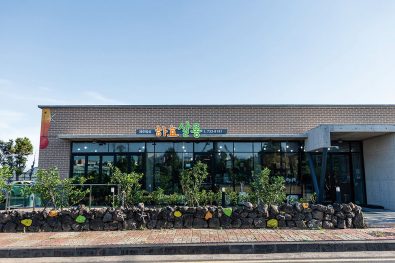
Hahyo Salon
- Address:
- 217-8 Hyodonsunhwan-ro, Seogwipo-si, Jeju-do
- Tel:
- 064-733-8181
- Business Hour:
- 11:00~18:00
- Closed during Korean traditional public holidays
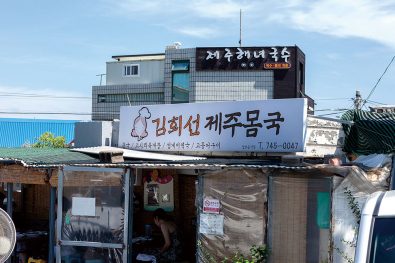
Kim Hee-seon Momguk
- Address:
- 73 Heungun-gil, Jeju-si, Jeju-do
- Tel:
- 064-745-0047
- Business Hour:
- 07:30~17:00
- Sat: 07:30~15:00
- Closed Sundays
Yeosu, Jeollanam-do
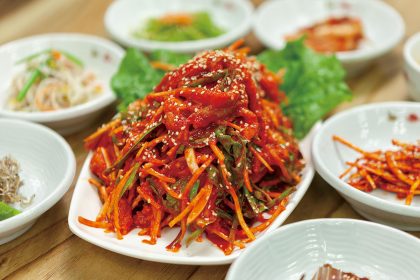
Seodaehoe muchim
Seodae (red tongue sole) is loved by Yeosu locals who say that even the mudflats where the fish is found must be delicious too
Seodae is a dark skinned, mottled flat fish well known for its chewy texture and umami flavor. Seadae, found in the sea near Yeosu, is much loved by the locals. Seodaehoe muchim is made with fresh raw sole, shredded fresh radish and water dropwort. They are tossed with a marinade of green onions, garlic and Korean chili paste to complete the salad. A few drops of rice wine vinegar are added to enhance the flavors of the ingredients. The dish is a popular accompaniment to alcoholic drinks. Before leaving the region, try some seodaehoe bibimbap where fresh seodaehoe is mixed with rice and sesame oil.
Recommended Restaurants
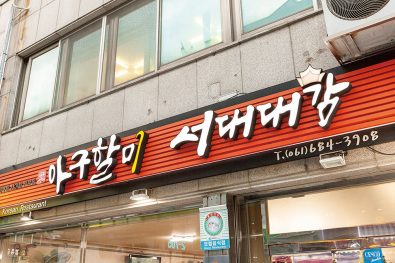
Aguhalmi Seodaedaegam
- Address:
- 54 Heungguk-ro, Yeosu-si, Jeollanam-do
- Tel:
- 061-684-3908
- Business Hour:
- 11:30~21:30
- Closed Sundays
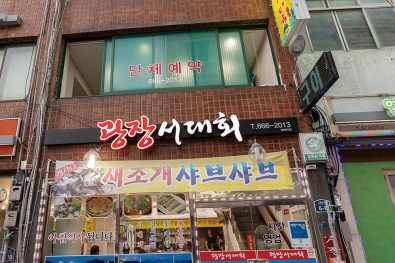
Gwangjang Seodaehoe
- Address:
- 6-8 Gyodongnam 1-gil, Yeosu-si, Jeollanam-do
- Tel:
- 061-666-2013
- Business Hour:
- 06:00~24:00
- Open year-round
Mokpo, Jeollanam-do
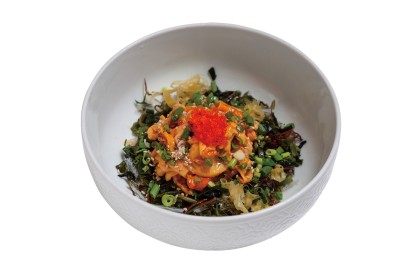
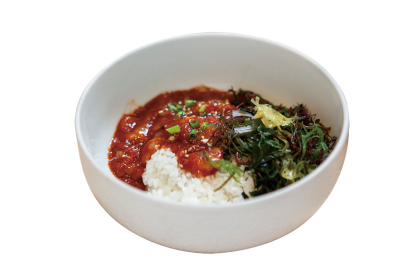
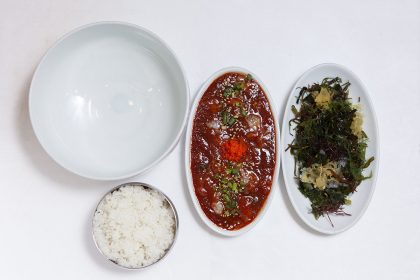
Kkotgesal bibimbap, Meongge bibimbap
The dish with its own mojo of captivating aromas and flavors
Kkotgesal bibimbap is made with well-marinated crab meat, vegetables and seaweed served over a bowl of rice. The marinade used for kkotgesal muchim (spicy swimming crab salad) is a mixture of Korean chili powder, soy sauce, garlic, ginger, sesame oil, and sesame seeds. The heavenly combination amplifies the crab’s flavor. The main ingredient of meongge bibimbap is sea pineapple that is gutted, finely chopped then salted. The salted meongge is then tossed with vegetables, rice, laver crumbs, sesame oil and sesame powder. Unlike other bibimbaps, Korean chili paste is not added to meongge bibimbap as meongge is already seasoned with salt, delivering you the clean and delicate flavor of sea pineapple.
“Place warmly cooked rice, kkotgesal and vegetables or seaweed into an empty bowl. Mix well and enjoy!”
Recommended Restaurants
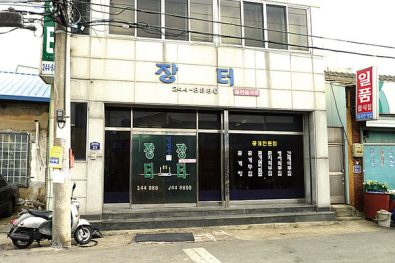
Jangteo Sikdang (Main Store)
- Address:
- 23 Yeongsan-ro, 40 beon-gil, Mokpo-si, Jeollanam-do
- Tel:
- 061-244-8880
- Business Hour:
- 11:30~21:00
- Closure Date:
- 1st Sundays
- 2nd, 3rd & 4th Mondays of the month
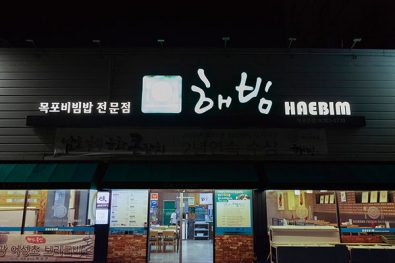
Haebim
- Address:
- 83 Mihang-ro, Mokpo-si, Jeollanam-do
- Tel:
- 061-282-2770
- Business Hour:
- 07:00~22:00
- Open year-round
Damyang, Jeollanam-do
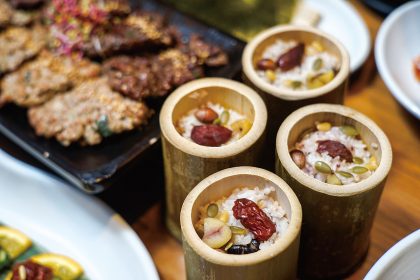
Daetongbap (bamboo steamed rice)
Grab the flavor, aroma and nutrients of bamboo
Damyang is a town famous for daenamoo (bamboo) forests. In Damyang, you can see that bamboo is part of the local food culture. The representative local delicacy is bamboo steamed rice. Rice plus an assortment of grains and nuts are steamed together inside a bamboo trunk. During the steaming process, the bamboo sap coats the rice, giving it a subtle yet distinctive fragrance, while delivering many health benefits. Be sure to enjoy the nutritious daetongbap, which goes well with tteokgalbi (grilled short rib patties).
“Only jeongsik (a set menu) is available. Daetongbap is not served a la carte.”
Recommended Restaurants
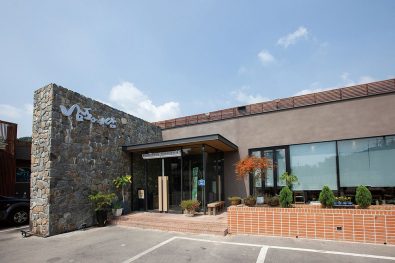
Namdoyedam Best Restaurant
- Address:
- 143 Damjang-ro, Wolsan-myeon, Damyanggun, Jeollanam-do
- Tel:
- 061-381-7766
- Business Hour:
- 11:30~21:00
- Closure Date:
- Open year-round
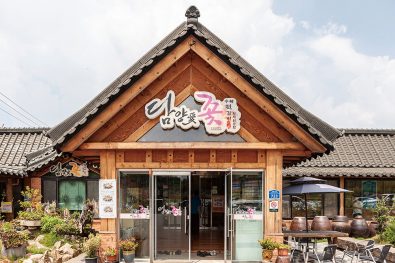
Damyangaekkot
- Address:
- 723 Jukhyang-daero, Bongsan-myeon, Damyanggun, Jeollanam-do
- Tel:
- 061-381-5788
- Business Hour:
- Weekdays:
- 11:00~20:00
- Weekends:
- 11:20~20:20
- Open year-round
- Weekdays:
Jeonju, Jeollabuk-do
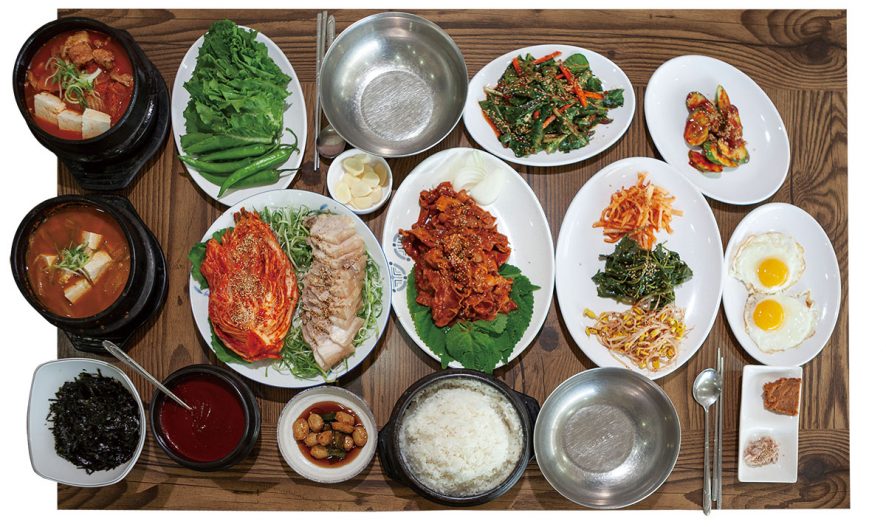
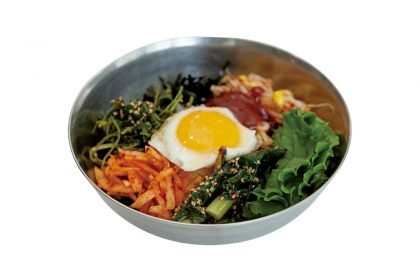
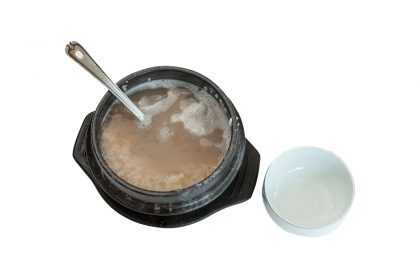
Home-style baekban (set menu)
Enjoy the charm of self-made bibimbap. Select the ingredients you like and mix them in a bowl
Home-style baekban is a daily meal Koreans eat at home. The larger portions are a distinctive feature of baekban in Jeonju, a famous gastronomic town. To make a one-dish meal, mix any ingredient of your choice such as green herbs, rich soybean paste, Korean chili paste or fried eggs with rice, laver crumbs and sesame oil. There are different types of baekban including bossam jeongsik baekban (vegetables, pork and rice); gochujang pork jeongsik (rice and stir-fried pork coated with Korean chili paste); hongeo jjigae baekban (rice and spicy skate stew); dongtae jjigae baekban (rice and pollack stew); and kimchi jjigae baekban (rice and kimchi stew).
“After the meal, sungjyung (scorched rice soup) is served as de ssert.”
“Make your own style of bibambap. Pick your favorite side dishes and toss them in a big bowl with rice, cheonggukjang and gochujang.”
Recommended Restaurants
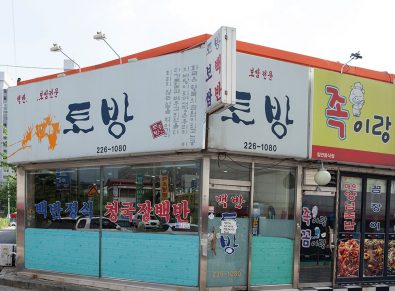
Tobang
- Address:
- 19 Pyeonghwa 18-gil, Wansan-gu, Jeonju-si, Jeollabuk-do
- Tel:
- 063-226-1080
- Business Hour:
- 10:00~21:30
- Closed Sundays
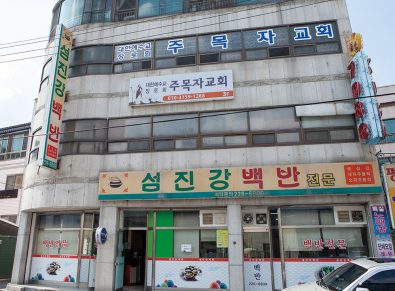
Seomjingang Baekban
- Address:
- 13 Kkotbatjeong-ro, Wansan-gu, Jeonju-si, Jeollabuk-do
- Tel:
- 063-226-6809
- Business Hour:
- 08:30~22:00
- Closed Sundays













![[A ZONE] Gangnam Food Spot](https://m.dgram.co.kr/wp-content/uploads/2020/09/A존-알래스카3-특성이미지_S-324x160.jpg)
![[A ZONE] Gangnam Life Style](https://m.dgram.co.kr/wp-content/uploads/2020/09/로우클래식1-특성이미지_S-324x160.jpg)




